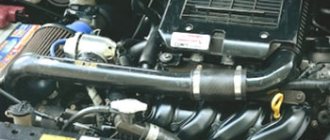The buyer of a new car assumes that for some period he will not be affected by problems with vehicle repairs. However, life doesn't always go as planned. Considering that the new car is under warranty, the car owner has the right to count on the dealership providing a replacement car while the repair work is being carried out. The proposed material examines in what situations this service is provided by companies selling cars, the features and rules for registration of issued vehicles and other related issues.
Legislative norms
According to the requirements of the Law “On the Protection of Consumer Rights”, if a car is subject to warranty repairs for more than forty-five days, the dealer must provide a replacement car free of charge to the client for the necessary time until the repaired equipment is returned. This means that the manufacturer, so that the car owner does not suffer from the breakdown of his car, must voluntarily compensate for the inconvenience in return for this car - he is obliged to provide a replacement car with similar characteristics to the one being repaired. But there is an important clarification in the legislation. This condition applies to any durable equipment other than those included in the relevant list approved by government decree. It also includes motor transport, so manufacturers are not obliged to provide such a service. But many manufacturers, in order to attract customers, provide a replacement. This condition is mandatory if the client is classified as a disabled person for whom such a means of transportation is vital or if the repair continues beyond the established forty-five days.
Experience in providing replacement vehicles by major manufacturers

Large companies that enter into a large number of transactions for the sale of vehicles solve the problem of substitution in advance.
The website states that we provide a replacement for the car being repaired under any conditions. However, the class and technical characteristics of the issued vehicle may differ significantly from the owner’s car for the worse.
The largest suppliers, such as Mercedes or Jaguar, prefer to prescribe a substitution clause in a standard vehicle sales agreement.
The most difficult thing for Skoda clients is to get a temporary car. Before making a decision, the manufacturer insists on conducting a comprehensive examination, based on the results of which the request is granted (or rejected).
When a car dealership provides a replacement car to a client
Many motorists are interested in exactly when a replacement car should be provided. It must be issued if this is provided for in the car purchase agreement with the car dealership.
If we consider insurance, then domestic legislation does not provide for such a service for repairs under compulsory motor liability insurance. In relation to CASCO, a motorist has the right to apply for a replacement vehicle if the duration of the work is more than forty-five days (as stated in Article 20 of the above-mentioned law). After the specified period, if the safety of the car has not been restored, the seller must reimburse the buyer a penalty in the amount of one percent of the price of the goods. For a shorter period of car restoration, given the serious bureaucratic registration procedure, there is no point in insisting on such a service.
In a situation with warranty service under a car warranty, many showrooms stipulate in the terms of the contract the provision of a replacement car during the repair of the main one, if the breakdown occurred within the specified period.
These possibilities are also not provided for by the legislation of most Western countries. However, most car dealers provide replacement cars voluntarily. This is due to high competition among various companies offering similar services. Therefore, in order to attract buyers, car dealerships themselves include in the contract the issuance of a replacement car if there is a need for warranty repairs of the purchased equipment.

Russian buyers are far from being in an advantageous position compared to Western ones, so when choosing a company that sells cars, you need to pay attention to the provision of such services.
Conditions for obtaining a “replacement car”
In addition to the fact that car dealerships try to provide customers with a replacement car on a paid basis, they also put forward a number of requirements to receive it:
- The car in question must be under warranty.
- Car repair work must be carried out exactly in the dealership where the car was purchased.
- The vehicle must be recognized as suitable for safe driving, otherwise there may be a danger to movable property and the driver.
Conditions for providing a replacement car
The buyer has the right to reasonably hope for the issuance of a replacement car only if certain mandatory conditions are met:
- the purchase is subject to a specified warranty period;
- the malfunction prevents the vehicle from being operated;
- Warranty service is carried out by the same company from which the product was purchased.
The above list can be expanded by car dealers at their discretion. Some companies provide these services on an individual basis. These points are reflected in the purchase and sale agreement. Sometimes the seller provides a rental fee for providing this service. This money is intended to compensate for depreciation during the operation of a replacement car and to pay off car insurance payments. However, such a condition is legal if the car is issued within the specified forty-five day period. You cannot charge rent beyond this period.
Therefore, before signing the contract, the buyer needs to check with the representatives of the car dealership about the possibility of providing such services free of charge, based on the requirements of the law on the protection of their rights. It is possible that, at the client’s request, the contract will take into account his claims and include relevant additional clauses.
But sometimes such assistance is provided by car dealerships only to selected clients in whose solvency the company is confident, or if we are talking about buying a car at a high cost.

A motorist in such a situation must:
- navigate issues of legislation that protect his rights to the quality of the goods provided;
- obtain documentary evidence that further operation of the machine poses a danger to the life of the owner and other people;
- know the specifics of the procedure for completing this request.
It must be taken into account that the provision of a replacement car is a voluntary procedure, therefore the car owner has the right to ask, and not demand, such compensation from a representative of the car dealership. But if the company does not mind satisfying the client’s request, it usually does not take much time to resolve the issue - the car is provided to the buyer within three days after submitting the request.
Not all car enthusiasts, when making a purchase, think about the possibility of unforeseen repairs while the car is under warranty. Car dealership specialists, when concluding a contract with a buyer, must carry out explanatory work, introducing the client to the main provisions of the contract and the possibilities of providing additional services in the event of unfavorable events.
Conditions for issuing a car
Most often, car dealers prefer to issue a replacement car in place of the car being repaired for an additional fee. In order for this process to be successful, many showrooms ask to provide arguments as to whether the buyer really urgently needs a vehicle. This question is especially relevant for the buyer if there is a need for long-term warranty repairs, and he needs the car for work, long trips, or for family reasons.
The client has the following requirements:
- the vehicle that is subject to repair has not expired;
- the product should be classified as unsuitable for further use, because failure to do so leads to adverse consequences for the machine and the owner;
- the period for correcting defects should not last longer than 45 days according to the law, otherwise the seller is forced to pay a penalty;
- if the driver decides to go to court or the prosecutor’s office to resolve the conflict, he needs to be aware of the time limits for repair work, the amount of the penalty, and the types of punishment for violations of deadlines;
- If the buyer intends to raise the issue with higher authorities about being provided with a car to replace the model under repair, the dealership manager should be notified about this. Typically, such issues are regulated at the local level, which eliminates the need to contact other authorities;
- According to the terms of the provision of transport, the car must be returned to the same dealership where it was purchased for correction of defects.
These requirements also apply to the issuance of a replacement vehicle during CASCO repairs. In any case, the car dealership makes a decision independently without the participation of supervisory authorities, which is important for both MTPL and CASCO insurance.
Features of the procedure
Many car owners are interested in how to get a replacement car and what documentation is required for this. In such a situation, the car owner needs to:
- study in detail the provisions of the legislation devoted to the protection of his rights;
- transfer the car for warranty repairs to the service center where the car was purchased or to the insurer’s workshop;
- prepare a document confirming that the malfunction poses a safety hazard;
- check with the service center the duration of repair work if it obviously exceeds a forty-five-day period;
- complete the documentation package. It is necessary to prepare papers for the car, the owner’s personal passport, contract, etc.;
- apply to the company where you bought the car with a request to provide a replacement.

Certain circumstances taken into account by the salon management include:
- classifying the buyer as a regular customer of the company;
- purchase of a VIP-class car;
- the duration of repairs under warranty obviously exceeds the above-mentioned periods;
- such a service is provided for in the purchase and sale agreement;
- the issuance of replacement vehicles is guaranteed by the insurer.
Considering the voluntary nature of providing a replacement, the car owner is recommended to clarify these points in advance, when concluding a contract before purchasing a car.
The replacement car does not have to be similar to the one purchased. It is possible to provide a car of a different brand and inferior in class. But these points must also be reflected in the contract.
In the domestic car market, similar conditions for purchasing cars are offered by large manufacturers that have the ability to satisfy customer requests. The car provided usually turns out to be far from new and not quite of the same class as the one purchased, but in a situation where the owner is left without transport for a while, there is no point in going overboard.
When is a dealer required to provide a replacement vehicle?
Taking into account the provisions of Part 2 of Art. 20 of the ZPP Law, the customer may request the dealer to replace the vehicle during warranty repairs. The responsible organization may provide a replacement vehicle upon request, but not necessarily. If the managers of the car dealership decide to temporarily replace the car, this service will be provided to the consumer free of charge. Both the manufacturer and the seller can provide a replacement vehicle. Both the organization and the individual entrepreneur have the opportunity to make the appropriate decision. The replacement must be carried out by the person with whom the purchase and sale agreement was concluded.
When receiving a replacement product, you must check that this product has similar characteristics and properties to the car in the service center. The seller does not have the right to shift the responsibility for bearing the costs associated with the delivery of a replacement vehicle to the client. If the consumer has submitted a corresponding request, the dealer’s representatives have approved it, the vehicle must be delivered at the specified time to the buyer’s place of residence.
The decision to satisfy the client's request is made quite quickly. Typically, a replacement will be provided within 3 days of the request, otherwise the buyer will be refused. The seller is not obliged to provide a similar vehicle, but may provide a replacement upon request. Many popular dealers provide a vehicle on their own initiative to preserve their reputation.
There are exceptions when the seller is obliged to issue a replacement vehicle:
- The product is intended specifically for use by disabled people.
- A ship or other watercraft is under warranty service.
- In case the warranty repair lasts more than 45 days.
Exceeding the period of stay of the car at the service center
If the above period expires, car service representatives have the following solutions to the situation:
- return the car to the owner at the end of the specified period if the fault has not been completely eliminated, but there is no safety threat;
- issue a replacement vehicle and complete the repair work;
- pay the owner a penalty in the amount of one percent of the total purchase price.
In such a situation, it is more profitable for the company to satisfy the car owner’s request than to pay a penalty or enter into legal disputes. In addition to material damage, this will not benefit the company’s reputation, which does not contribute to the growth of sales, given the competitive environment.
A car enthusiast, if the resolution of the issue is delayed indefinitely, needs to contact the company management to try to resolve this issue through an agreement. What to do if an agreement fails is described below.
I received a replacement car during the repair period. They were given a power of attorney to manage it for 2 weeks.
Federal Law of April 25, 2002 N 40-FZ (as amended on May 1, 2019) “On compulsory insurance of civil liability of vehicle owners”
Article 14.1. Direct indemnity(introduced by Federal Law dated December 1, 2007 N 306-FZ)
1. The victim makes a claim for compensation for damage caused to his property to the insurer who insured the civil liability of the victim, if the following circumstances exist simultaneously:
a) as a result of a traffic accident, damage was caused only to the vehicles specified in subparagraph “b” of this paragraph;
Consultant Plus: note.
From 10/29/2019 at pp. "b" clause 1 art. 14.1 is amended (Federal Law dated 01.05.2019 N 88-FZ). See future edition.
Consultant Plus: note.
Provisions of paragraphs. "b" clause 1 art. 14.1 (as amended by Federal Law No. 49-FZ of March 28, 2017) apply to relations arising as a result of an accident that occurred after September 25, 2017.
b) a traffic accident occurred as a result of the interaction (collision) of two or more vehicles (including vehicles with trailers), the civil liability of the owners of which is insured in accordance with this Federal Law.
(as amended by Federal Laws dated July 21, 2014 N 223-FZ, dated March 28, 2017 N 49-FZ)
(see text in the previous edition)
2. The insurer, which insured the civil liability of the victim, assesses the circumstances of the road traffic accident, set out in the notification of the road traffic accident, and, on the basis of the submitted documents, provides compensation to the victim at his request in accordance with the rules of compulsory insurance.
3. The exercise of the right to direct compensation for losses does not limit the right of the victim to contact the insurer who insured the civil liability of the person who caused the harm, with a claim for compensation for harm caused to life or health, which arose after the presentation of the claim for direct compensation for losses and about which the victim did not knew at the time the claim was made.
(as amended by Federal Law dated July 21, 2014 N 223-FZ)
(see text in the previous edition)
4. The insurer that insured the civil liability of the victim shall compensate for damage caused to the property of the victim on behalf of the insurer that insured the civil liability of the person who caused the harm (carries out direct compensation for losses), in accordance with the direct compensation agreement provided for in Article 26.1 of this Federal Law losses in the amount determined in accordance with Article 12 of this Federal Law.
In relation to the insurer that insured the civil liability of the victim, in the event of a claim for direct compensation for losses being presented to it, the provisions of this Federal Law, which are established in relation to the insurer to whom the claim for insurance compensation was presented, are applied.
(as amended by Federal Law No. 49-FZ dated March 28, 2017)
(see text in the previous edition)
(Clause 4 as amended by Federal Law dated July 21, 2014 N 223-FZ)
(see text in the previous edition)
5. The insurer, which insured the civil liability of the person who caused the harm, is obliged to compensate, on account of the insurance compensation under the compulsory insurance contract, the insurer that provided direct compensation for losses, the damage it compensated to the victim in accordance with the agreement on direct compensation for losses provided for in Article 26.1 of this Federal Law.
(as amended by Federal Laws dated July 21, 2014 N 223-FZ, dated March 28, 2017 N 49-FZ)
(see text in the previous edition)
Consultant Plus: note.
From August 26, 2017, for disputes specified in clause 5.1 of Art. 14.1, pre-trial appeal to the RSA commission is mandatory. Previously filed claims are subject to consideration according to the rules of the Arbitration Procedure Code of the Russian Federation (Federal Law dated July 26, 2017 N 197-FZ).
5.1. If a dispute arises about compensation by the insurer that insured the civil liability of the person who caused the harm, on account of the insurance compensation for damage compensated by the insurer that provided direct compensation for losses, such a dispute is considered by a commission formed by a professional association of insurers within 20 calendar days, with the exception of non-working holidays days from the date the commission received the insurer’s application. If the insurer disagrees with the decision of the commission or the commission fails to make a decision within the established period, the dispute is considered by an arbitration court based on the insurer’s statement of claim.
(clause 5.1 introduced by Federal Law dated July 26, 2017 N 197-FZ)
6. In the event of exclusion of the insurer that insured the civil liability of the person who caused the harm from the agreement on direct compensation for losses or the arbitration court makes a decision to declare such an insurer bankrupt and to open bankruptcy proceedings in accordance with the legislation on insolvency (bankruptcy) or in the event of withdrawal from without a license to carry out insurance activities, the insurer who has made direct compensation for losses has the right to demand from a professional association of insurers a compensation payment in the amount established by the agreement on direct compensation for losses in accordance with Article 26.1 of this Federal Law.
(as amended by Federal Laws dated July 21, 2014 N 223-FZ, dated March 28, 2017 N 49-FZ)
(see text in the previous edition)
7. The insurer who insured the civil liability of the person who caused the harm and reimbursed the insurance compensation under the compulsory insurance contract to the insurer who made direct compensation for losses, the damage it compensated to the victim, in the cases provided for in Article 14 of this Federal Law, has the right to claim against the person who caused damage in the amount of compensation to the victim.
(Clause 7 introduced by Federal Law dated July 21, 2014 N 223-FZ; as amended by Federal Law dated March 28, 2017 N 49-FZ)
(see text in the previous edition)
8. A professional association of insurers, which has reimbursed the compensation to the victim as compensation under a compulsory insurance contract to the insurer that provided direct compensation for losses, in the cases provided for in Article 14 of this Federal Law, has the right to claim against the person who caused the harm in the amount of compensation to the victim.
(Clause 8 introduced by Federal Law dated July 21, 2014 N 223-FZ)
9. A victim who, in accordance with this Federal Law, has the right to submit a claim for compensation for damage caused to his property directly to the insurer who insured the civil liability of the victim, if the arbitration court makes a decision to declare such an insurer bankrupt and to open bankruptcy proceedings in accordance with the legislation on insolvency (bankruptcy) or in the event of revocation of his license to carry out insurance activities, makes a claim for insurance compensation to the insurer who insured the civil liability of the person who caused the harm. In this case, the victim does not have the right to receive compensation payment on the basis of the impossibility of providing insurance compensation by the insurer that insured the civil liability of the victim.
Where to contact in case of refusal
If contacting a car dealership is unsuccessful, the buyer can demand protection of his rights in court. However, it must be taken into account that the company is not legally obliged to provide a replacement car, but compensation for damage, including material damage, must be carried out in other ways - payment of a penalty in the amount of one percent of the price of the car, full warranty repairs and other conditions. Also, the car owner must replace the car or return the money if defects that prevent its safe operation are identified within fifteen days after purchasing the product.
As follows from the presented material, according to the provisions of domestic legislation, a car dealership is not obliged to provide the buyer with a replacement vehicle during warranty repairs of the purchased car, even if the restoration takes more than forty-five days. However, many companies provide such services on a voluntary basis, including such points in the purchase and sale agreement. Also, to compensate for damage, buyers are provided with other rights that allow them to partially compensate for losses incurred.
Who offers vehicles during repairs?
In addition to Ford, other well-known companies also provide such services. Thus, in the companies Jaguar, Mercedes-Benz, and BMW, such a service is included in the purchase and sale agreement as one of the main clauses.
The famous company KIA offers this type of service to its customers on its official website. This is not only a concern for its customers, but also a certain advertisement of the car manufacturer.
In turn, Skoda is ready to issue a replacement car, but only if it is examined. But it is worth noting that if the machine does not work, then there will be no problems with its temporary replacement.
The most famous companies producing luxury cars, such as Rolls-Royce, Lamborghini, Porsche, Bugatti, are ready, for the sake of their reputation, not only to issue a replacement car, but also to pay a 1% penalty every day (the cost of the car is taken into account).
The provision of a replacement car is provided by some insurance companies. Whether such a service will be provided depends on the terms of the car insurance program.
In most cases, such a service is included in premium insurance packages. All other cases directly depend on the terms of the CASCO insurance contract.
Solving the issue in practice
The dealer may refuse to issue a replacement car unless otherwise specified in the agreement with the consumer. The buyer has the right to demand a replacement only if repairs under warranty are carried out longer than 45 days. Many prestigious companies pay a penalty or provide a replacement car if repairs are delayed, without entering into disputes with customers.
In some cases, the contract provides for the possibility of issuing a replacement car for a fee. The cost of this service and the conditions for its provision must be discussed in advance in order to exercise your right without any problems. The possibility of obtaining a replacement car is specified in the contract when purchasing cars from Ford, Jaguar, BMW and Mercedes-Benz. Often, drivers are provided with cars whose class is lower than that of the cars being repaired, but they can be obtained without problems, guided by the terms of the contract.
When the seller makes concessions
In what cases are they given a replacement car if the car is being repaired? It is believed that the seller can make certain concessions to his clients in situations where:
- A regular and financially secure client needs a car.
- An expensive car is being repaired.
- The company's management has friendly or family relations with the buyer.
- If the warranty period is exceeded - this period is defined as 45 days, for delay the dealer must pay the buyer 1% of the total cost of the car for each day.
But if the breakdown is not serious, for example, something has gone wrong in the air conditioning system, radio, etc., most likely the car will be returned to the owner, and then taken back to the service station. But such delays may be mainly due to shortages of parts.
However, it is worth considering that some dealers initially, as a sign of high loyalty to their customers, prescribe the provision of a replacement car if necessary.
In this case, a replacement car must be provided after receiving an application from the client within three days.
The answer to the question: in what cases is a car dealership obliged to provide a replacement car, the answer will be: in none.
How to increase your chances of getting a replacement car?
For some car owners, dealers provide a replacement vehicle upon request for the duration of repairs. Some drivers cannot obtain this privilege when submitting an official request.
The following factors help increase your chances of getting a similar vehicle while your car is being repaired:
- Purchasing an expensive car or a car from a limited collection.
- Purchasing multiple cars from one dealership. Sellers show a better attitude towards regular customers and are willing to make concessions.
- The maximum repair period is coming to an end. Warranty repairs must be carried out within a period of no more than 45 days. After this time, the consumer must be given a serviceable vehicle ready for use or provided with a replacement. Otherwise, for late repairs under warranty, the seller is obliged to pay a daily penalty in the amount of 1% of the cost of the car.
Peculiarities
When the management of the dealership makes a positive decision to issue a replacement car, the client receives the car that the responsible employee will choose. A car received for temporary use will not necessarily have the same qualities as a vehicle being repaired. In most cases, consumers receive used cars.
Some dealers provide a high-quality car replacement service. Clients receive high-quality vehicles. If you purchase a premium car and it breaks down, employees will offer you a car with identical characteristics, since otherwise the dealer risks losing the customer forever.
Basic rules for obtaining a replacement car:
- Replacements are more readily provided to people purchasing high-end goods. Often, showroom managers provide replacement cars in the event of a breakdown to familiar and regular customers.
- You can demand the provision of a replacement car or payment of a penalty only after one and a half months from the start of repair work.
- You can be guaranteed to receive a replacement car before the maximum repair period expires only if there is a special clause in the contract.
The dealer has the opportunity to provide the client with a replacement car. When purchasing a vehicle, it is advisable to discuss with the seller the conditions for obtaining a suitable vehicle for the duration of the repair. Sometimes it is possible to negotiate a similar car for a reasonable fee. If such a condition is not specified in the contract, the dealer has the right to refuse the consumer until the maximum period of warranty repairs has expired.





